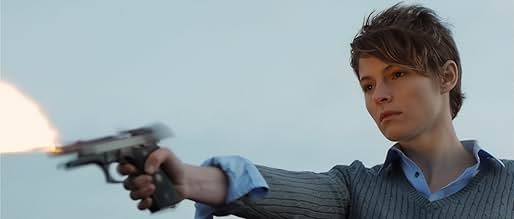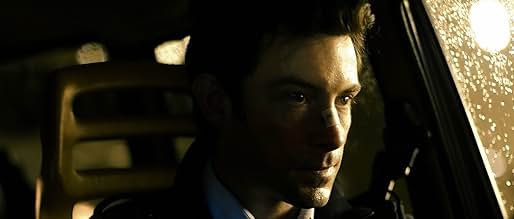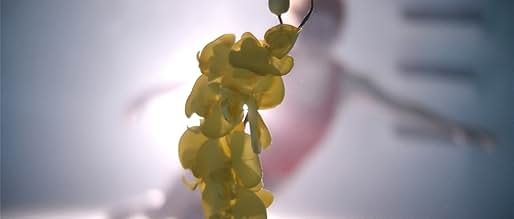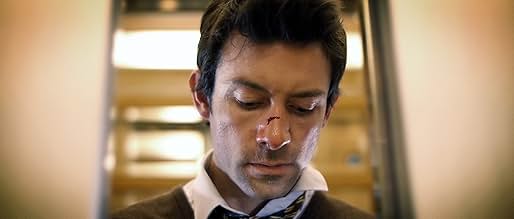IMDb-BEWERTUNG
6,5/10
35.752
IHRE BEWERTUNG
Ein Mann und eine Frau sind voneinander angezogen, verwickelt in den Lebenszyklus eines zeitlosen Organismus. Identität wird zur Illusion, als sie darum kämpfen, die losen Fragmente zerstört... Alles lesenEin Mann und eine Frau sind voneinander angezogen, verwickelt in den Lebenszyklus eines zeitlosen Organismus. Identität wird zur Illusion, als sie darum kämpfen, die losen Fragmente zerstörter Leben zusammenzufügen.Ein Mann und eine Frau sind voneinander angezogen, verwickelt in den Lebenszyklus eines zeitlosen Organismus. Identität wird zur Illusion, als sie darum kämpfen, die losen Fragmente zerstörter Leben zusammenzufügen.
- Auszeichnungen
- 5 Gewinne & 35 Nominierungen insgesamt
Andreon Michael
- Peter
- (as Andreon Watson)
John Walpole
- Bank Investigator
- (as Trey Walpole)
Empfohlene Bewertungen
UPSTREAM COLOR is already baffling the hell out of the world and will especially draw disapproval on IMDb.
The plot is not delivered in a way that is traditionally comprehensible, only to those paying close attention to the themes that unite it all. If you're already rolling your eyes THIS MOVIE IS NOT FOR YOU.
If however you have experienced or would like to experience films where you have to dedicate your ability to assess and determine the underlying idea that is linking a series of enigmatic actions and subtle scenes, UPSTREAM COLOR will intrigue and probably charm you. It very much plays to the TREE OF LIFE crowd.
For me, it's undoubtedly a massive artistic accomplishment. Hugely evocative and if you unearth those ideas, the ability to have human connection, abuse, hope and language among them, you'll have no problem following along and the ending will be very satisfying.
If you want to say "you're not supposed to understand it, just feel it" that's fine. I think that if you stop and ask yourself what idea is driving moments, you can follow along just fine. The story is in the themes. Details are abstract to drive home this point.
I took off two stars because I found the serious tone and sombre score to be so focused and constant, the atmospherics became a little more monotonous than I think was intended. The briefest of levity here and there might have offset the heaviness.
If you're still reading, check it out.
The plot is not delivered in a way that is traditionally comprehensible, only to those paying close attention to the themes that unite it all. If you're already rolling your eyes THIS MOVIE IS NOT FOR YOU.
If however you have experienced or would like to experience films where you have to dedicate your ability to assess and determine the underlying idea that is linking a series of enigmatic actions and subtle scenes, UPSTREAM COLOR will intrigue and probably charm you. It very much plays to the TREE OF LIFE crowd.
For me, it's undoubtedly a massive artistic accomplishment. Hugely evocative and if you unearth those ideas, the ability to have human connection, abuse, hope and language among them, you'll have no problem following along and the ending will be very satisfying.
If you want to say "you're not supposed to understand it, just feel it" that's fine. I think that if you stop and ask yourself what idea is driving moments, you can follow along just fine. The story is in the themes. Details are abstract to drive home this point.
I took off two stars because I found the serious tone and sombre score to be so focused and constant, the atmospherics became a little more monotonous than I think was intended. The briefest of levity here and there might have offset the heaviness.
If you're still reading, check it out.
Greetings again from the darkness. This is no typical movie, so these will not be typical comments. In 2004, Shane Carruth became something of a cult hero with the Sundance Festival crowd when his debut film PRIMER won a Grand Jury Award. Nine years later, we get his follow-up ... the ultimate artsy, indie film for those who thrive on analysis and prefer to avoid a story ending wrapped up with a neat bow.
These comments will not give you much, but I can tell you the screening had many viewers who left frustrated and confused. The fragmented narrative can be a bit disorienting and it avoids the usual staple of a resolution at the end. The audience knows more than the characters, yet the audience is baffled while the characters just continue on.
The first segment of the film is when it's at its most traditional. We see Thief (Thiago Martins) perform some type of worm/parasite procedure that slowly brainwashes Kris (Amy Seimetz) or leads to mind control or loss of personality ... just depends how you prefer to describe it. We then see The Sampler (Andrew Sensenig) help her overcome thanks to a blood transfusion on his pig farm. Yes, really. Finally, Kris bonds with Jeff (Shane Carruth) as they seek to reassemble their lives and re-discover themselves. Watching them bicker over who belongs to what memory is frightening and fascinating. It makes you question the definition of personal identity, and what if we lost that (or it was stolen).
Nature plays a huge role here, along with the connection to Thoreau's Walden. Many will use the term pretentious. Some will call it boring. Still others will be drawn in by the imagery and sound (or sometimes lack thereof). Shane Carruth does not fit Hollywood and neither do his films. He is a writer, producer, director, co-editor, cinematographer, and actor. He clearly has a love of the material and his choice of Amy Seimetz really makes the film work. She is outstanding (and also a filmmaker). The tired phrase "it's not for everyone" certainly applies here, but if you are a Terrence Malick fan or just enjoy being challenged by somewhat abstract themes, this one is worth a look.
These comments will not give you much, but I can tell you the screening had many viewers who left frustrated and confused. The fragmented narrative can be a bit disorienting and it avoids the usual staple of a resolution at the end. The audience knows more than the characters, yet the audience is baffled while the characters just continue on.
The first segment of the film is when it's at its most traditional. We see Thief (Thiago Martins) perform some type of worm/parasite procedure that slowly brainwashes Kris (Amy Seimetz) or leads to mind control or loss of personality ... just depends how you prefer to describe it. We then see The Sampler (Andrew Sensenig) help her overcome thanks to a blood transfusion on his pig farm. Yes, really. Finally, Kris bonds with Jeff (Shane Carruth) as they seek to reassemble their lives and re-discover themselves. Watching them bicker over who belongs to what memory is frightening and fascinating. It makes you question the definition of personal identity, and what if we lost that (or it was stolen).
Nature plays a huge role here, along with the connection to Thoreau's Walden. Many will use the term pretentious. Some will call it boring. Still others will be drawn in by the imagery and sound (or sometimes lack thereof). Shane Carruth does not fit Hollywood and neither do his films. He is a writer, producer, director, co-editor, cinematographer, and actor. He clearly has a love of the material and his choice of Amy Seimetz really makes the film work. She is outstanding (and also a filmmaker). The tired phrase "it's not for everyone" certainly applies here, but if you are a Terrence Malick fan or just enjoy being challenged by somewhat abstract themes, this one is worth a look.
I attended this film solo (only one other person in the theater) which turned out to be a good thing as distractions were nil. Carruth has a lot of respect for the viewer. He doesn't do exposition. And if you pay close attention to this film, you wont need it. Unlike other reviews I've seen, I found Primer much harder to suss out than Upstream Color. There was a clear narrative here and the main protagonists arc is clear to see. I loved it. It was intense, beautifully shot, scored, and of course acted, especially by Amy Seimetz, the lead. She was amazing. If you like your films delivered to you on a silver platter, then this is not for you. But if you like to think a little bit, you will find the 90+ minutes of Upstream Color thoroughly enjoyable. I hope it does very well. And I hope Carruth doesn't take another 8 yrs to do his next one.
Here's a film which ponders suffering and celebrates beauty and meaning, so at least on this count I am firmly behind it.
The point is how to have the lesson, for instance that love redeems, which we know in words but often eludes us in life as experience that needs no explaining beyond itself, as actual insight, as something which wrapping it around us we will know its warmth by simple feel.
Well, most serious films try something of the sort.
Usually how it works, is that there is an interplay of 'hard' and 'soft' elements. Hard would be all the stuff that particularize and discriminate, the more of these we have the harder it is to have unmediated insight because what happens in the story registers in a topical way, for instance a story of female Irish workers in the sewing industry of 1915. Soft is the flow of urges and self as one space for reflection, Malick's latest seems to be the pinnacle at around this time. Wong Kar Wai does it.
Usually, we start with some 'hard' particulars and open up in a 'soft' way, shedding self. But now and then, we get a major blunder like Cloud Atlas where the point is the soft insight of interconnected life but that is fenced on all sides by hard impositions, conspiracies, gunfights etc.
This is a weird, complicated narrative, unnecessarily so for my taste but once you see past the complexity, it is a simple thing. The idea is that there is something in nature which worms its way into the soul and is the cause of all suffering. Seemingly this is producing the anomalies that manifest in the narrative, if suffering sounds overly religious call it an existential dissatisfaction or malaise. We get to see the effect of this in a relationship between a man and woman, how what is eating them keeps tossing them apart and together again.
The 'soft' portion of the film is this tumultuous relationship, the point is it could be yours. We have digress, dissonance, reluctance, knowing and knowing the other so well you can't tell his memories from your own. Some marvellous birdwatching, love as agreeing on the same birds.
Kar Wai is king of this 'pure' emotional space, because he traces particulars faintly into the night, the yearning and alienation as something elusive in the air. Malick which this film reminds of, renders them as huge, abstract forces that buffet us, war or loss.
Here, the entire framework is schematic and 'hard' in the extreme, an actual worm, hypnosis, a sinister surgery of some kind, more clearly the man who keeps the pigs fenced and wanders around trying to 'capture' on tape the manifold sounds, which stands for a broader human endeavor.
I find that this approach cheapens and reduces. Suddenly it is about technology and greed, a clumsy set of metaphors.
So overall, this comes heavily on the side of a silly eccentricity. Next to Malick who is an influence in the solemnity of atmosphere, I was reminded at times of Synecdoche, Wax: Or the Invention of Television among the Bees, Southland Tales, even Begotten, all of them ambitious ventures constrained by a symbolic notation on the ideas.
The ending is so silly it has to be seen, the choice of metaphors is the most ludicrous since Cremaster which all but destroys the film.
The point is how to have the lesson, for instance that love redeems, which we know in words but often eludes us in life as experience that needs no explaining beyond itself, as actual insight, as something which wrapping it around us we will know its warmth by simple feel.
Well, most serious films try something of the sort.
Usually how it works, is that there is an interplay of 'hard' and 'soft' elements. Hard would be all the stuff that particularize and discriminate, the more of these we have the harder it is to have unmediated insight because what happens in the story registers in a topical way, for instance a story of female Irish workers in the sewing industry of 1915. Soft is the flow of urges and self as one space for reflection, Malick's latest seems to be the pinnacle at around this time. Wong Kar Wai does it.
Usually, we start with some 'hard' particulars and open up in a 'soft' way, shedding self. But now and then, we get a major blunder like Cloud Atlas where the point is the soft insight of interconnected life but that is fenced on all sides by hard impositions, conspiracies, gunfights etc.
This is a weird, complicated narrative, unnecessarily so for my taste but once you see past the complexity, it is a simple thing. The idea is that there is something in nature which worms its way into the soul and is the cause of all suffering. Seemingly this is producing the anomalies that manifest in the narrative, if suffering sounds overly religious call it an existential dissatisfaction or malaise. We get to see the effect of this in a relationship between a man and woman, how what is eating them keeps tossing them apart and together again.
The 'soft' portion of the film is this tumultuous relationship, the point is it could be yours. We have digress, dissonance, reluctance, knowing and knowing the other so well you can't tell his memories from your own. Some marvellous birdwatching, love as agreeing on the same birds.
Kar Wai is king of this 'pure' emotional space, because he traces particulars faintly into the night, the yearning and alienation as something elusive in the air. Malick which this film reminds of, renders them as huge, abstract forces that buffet us, war or loss.
Here, the entire framework is schematic and 'hard' in the extreme, an actual worm, hypnosis, a sinister surgery of some kind, more clearly the man who keeps the pigs fenced and wanders around trying to 'capture' on tape the manifold sounds, which stands for a broader human endeavor.
I find that this approach cheapens and reduces. Suddenly it is about technology and greed, a clumsy set of metaphors.
So overall, this comes heavily on the side of a silly eccentricity. Next to Malick who is an influence in the solemnity of atmosphere, I was reminded at times of Synecdoche, Wax: Or the Invention of Television among the Bees, Southland Tales, even Begotten, all of them ambitious ventures constrained by a symbolic notation on the ideas.
The ending is so silly it has to be seen, the choice of metaphors is the most ludicrous since Cremaster which all but destroys the film.
As you all know, with PRIMER, Shane Carruth announced himself to the world as a naturally gifted talent, one who could rival the likes of James Cameron. Of course, it never happened as he struggled to get his second film off the ground.
Nine years after PRIMER Shane Carruth's long awaited second film is as dense as expected, with an impossible to understand third act that still manages to intrigue due to its sheer technical mastery. With UPSTREAM COLOR Carruth proves he is not a one-shot wonder. He also proves he is the ultimate NYC and L.A. art-film director incapable of adapting to more mainstream story telling.
Much has been written about the plot so I will not get into the specifics here. What I will say is that I think Carruth purposely holds critical information from his films as a way to challenge viewers and force them to think. This is admirable. But in the end, a bit frustrating because with just a few answers both PRIMER and now UPSTREAM COLOR would be fit for the masses without compromising artistic integrity.
The film made sense to me for about an hour and then it started to slip away. Like with Primer, I just lost my footing and could not gain hold. Amazingly enough, I still enjoyed the experience and was never bored, In fact, at times I was held in genuine suspense.
The third act has been described as 30 minutes without dialog and that simply is not true. There are numerous sequences without dialog and about halfway through we get a major sequence of events told with visuals and music. Then we have some more conventional filmmaking (conventional is really not the right word) followed by what I think might be around 15 minutes of dialog free visuals. The ending makes no sense to me, but I will see the film again and hope to sort it out.
Carruth designed the sound and composed the music and let me tell you, he hit both out of the park. The man could work scoring films and make a great living. The same goes for his sound design.
I watched the film at IFC in New York City and they have a pretty good sound system. What they don't have is a great screen. It might be the proper widescreen aspect ratio, but the images appeared darker in sections and that harmed Carruth's amazing visuals, rumored to have been captured with a hacked $700 Pansonic DSLR (the GH2). The image is akin to a RED or Alexa and throughout Carruth plays with shallow depths of field. This results in some shots missing the sharply focused mark, but for the most part the visuals shine. This film proves you do not need Hollywood style lighting and equipment to make Hollywood level films.
The Blu-Ray will be out in May and I have already put it on order at Amazon. There is no question in my mind that by year's end I will have sat through UPSTREAM COLOR numerous times.
I look forward to Carruth's next film, but with the hope for a little more clarity in his narrative.
Nine years after PRIMER Shane Carruth's long awaited second film is as dense as expected, with an impossible to understand third act that still manages to intrigue due to its sheer technical mastery. With UPSTREAM COLOR Carruth proves he is not a one-shot wonder. He also proves he is the ultimate NYC and L.A. art-film director incapable of adapting to more mainstream story telling.
Much has been written about the plot so I will not get into the specifics here. What I will say is that I think Carruth purposely holds critical information from his films as a way to challenge viewers and force them to think. This is admirable. But in the end, a bit frustrating because with just a few answers both PRIMER and now UPSTREAM COLOR would be fit for the masses without compromising artistic integrity.
The film made sense to me for about an hour and then it started to slip away. Like with Primer, I just lost my footing and could not gain hold. Amazingly enough, I still enjoyed the experience and was never bored, In fact, at times I was held in genuine suspense.
The third act has been described as 30 minutes without dialog and that simply is not true. There are numerous sequences without dialog and about halfway through we get a major sequence of events told with visuals and music. Then we have some more conventional filmmaking (conventional is really not the right word) followed by what I think might be around 15 minutes of dialog free visuals. The ending makes no sense to me, but I will see the film again and hope to sort it out.
Carruth designed the sound and composed the music and let me tell you, he hit both out of the park. The man could work scoring films and make a great living. The same goes for his sound design.
I watched the film at IFC in New York City and they have a pretty good sound system. What they don't have is a great screen. It might be the proper widescreen aspect ratio, but the images appeared darker in sections and that harmed Carruth's amazing visuals, rumored to have been captured with a hacked $700 Pansonic DSLR (the GH2). The image is akin to a RED or Alexa and throughout Carruth plays with shallow depths of field. This results in some shots missing the sharply focused mark, but for the most part the visuals shine. This film proves you do not need Hollywood style lighting and equipment to make Hollywood level films.
The Blu-Ray will be out in May and I have already put it on order at Amazon. There is no question in my mind that by year's end I will have sat through UPSTREAM COLOR numerous times.
I look forward to Carruth's next film, but with the hope for a little more clarity in his narrative.
Wusstest du schon
- WissenswertesThe film that Kris is editing at the beginning of the movie is A Topiary, the film that Shane Carruth had begun production on before deciding to film Upstream Color instead.
- PatzerWhen the Sampler is incapacitating a pig with his instrument, the knot is thrown towards the pig's face and stretched. In the next frame, the wire knot is around the pig's body between its front & hind legs.
- VerbindungenFeatured in WatchMojo: Top 10 Best Sci-Fi Movies You've Probably Never Seen (2016)
Top-Auswahl
Melde dich zum Bewerten an und greife auf die Watchlist für personalisierte Empfehlungen zu.
- How long is Upstream Color?Powered by Alexa
Details
Box Office
- Budget
- 50.000 $ (geschätzt)
- Bruttoertrag in den USA und Kanada
- 444.098 $
- Eröffnungswochenende in den USA und in Kanada
- 28.649 $
- 7. Apr. 2013
- Weltweiter Bruttoertrag
- 587.174 $
Zu dieser Seite beitragen
Bearbeitung vorschlagen oder fehlenden Inhalt hinzufügen



























